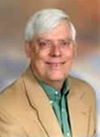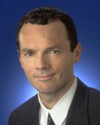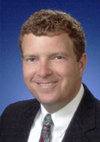Analytical Alumni Comments
Bob Curry
CEO, Sensys Medical
When I reflect back on my career to date, I am awed by the strong positive influence the people and unique environment for instrument development at Purdue have had on whatever success I have enjoyed. I received my Ph.D. in Chemistry from Purdue University in 1974. Harry Pardue was a marvelous research advisor, providing direction when I needed it, but independence to solve problems when I could. My thesis described the first use of photon counting in fluorimetry, just one of the many 'firsts' in instrument development that characterize analytical chemistry at Purdue. During my early career, I held positions at Pathlabs Inc., BioRad, and Becton Dickinson, companies that specialized in medical diagnostics and medical devices. I used my expertise in instrumentation to solve a range of problems in immunochemistry and flow cytometry. Sandwiched between these ventures was an appointment to the chemistry faculty at the University of Delaware, where the mentoring I had received while at Purdue was put directly to work in forming my own research group and caring for their growth as scientists. The consulting work I did as a faculty member soon drew me back into the corporate world, and eventually into the entrepreneurial world that has been my life’s passion. As a venture capitalist, I have successfully started or nurtured 38 companies, almost all of which involve biomedical instrumentation. 15 of these companies were directly in medical diagnostics, where accurate, reproducible measurements are the key to success. In one of my current start-ups, we are developing a non-invasive glucose monitor for diabetics. The successful solution to this important problem has required careful attention to every aspect of the measurement process taught to me so well by the pioneers in instrument development at Purdue.
Throughout my career, I have enjoyed my on-going interactions with the faculty at Purdue. The strong tradition in instrument development remains the cornerstone of the Chemistry Department today. The Amy Facility for Advanced Instrumentation provides a unique infrastructure supporting instrument development, with its highly trained staff with expertise in electronics, computer control, and every other aspect of instrument development. In my opinion, the faculty at Purdue is without equal in the business of instrument development. I also sense a real synergy between faculty and students and a common sense of purpose and camaraderie that make this a special place for everyone involved. The future for instrument development at Purdue is bright indeed, and I look forward to seeing the breakthroughs that are to come from their current and future efforts.
Randy Julian
Indigo Biosystems
There is something transformative about working with instrumentatio n during the development of a scientist. For me, seeing the sophistication and elegance of the experiments underway at Purdue, led to asking the question: 'to what lengths am I prepared to go to know something?' Seeing all those students in all those labs, building, using and analyzing data from such a wide range of instruments with such a wide range of interests changed my outlook on science. As a result of this experience, I have been able to pursue a drug discovery career performing complex experiments and measurements with the confidence that if the question deserves to be answered, it is worth the effort to create the systems needed to answer it. Over the years I have kept in close touch with Purdue, mostly to always remind myself of the quality of effort that someone suffering from a disease deserves."
Raymond Kaiser
Wyeth Pharmaceuticals
I have spent the last 17 years in the biotechnology industry on the discovery, development and manufacture of therapeutic proteins and vaccines. It has been exciting to be part of the rapid growth in this industry and of the supporting technologies. I believe, however, that the success of this industry is firmly rooted in the innovations made in analytical technologies. During my graduate tenure at Purdue, I recall the scientific reality that it was very difficult to analyze large complex protein molecules to the same level as small organically synthesized molecules. In the late 1980s, if one could analyze a peptide greater than a few thousand daltons by mass spectrometry, you were pushing the envelope of current capabilities. I also recall being part of the dialogue with government regulators that the complexity of therapeutic proteins were such that it would not possible to ever market 'generic' type therapeutic protein products. In those days, our understanding of these complex molecules were limited by a small handful of rather 'blunt' analytical methods, such as gel electrophoresis. Simply, in those days, we did not have the 'analytical horsepower' to understand the structural aspects of this class of molecule.
What has changed in the last 1.5 decades? Clearly, new analytical tools have been developed to allow researchers to fully characterize very large molecules, like proteins and polymers. Darwinian principles apply here, the analytical innovation occurs followed by analytical tool development and then followed by applications.....and the most capable tools survive. Regarding the biotechnology industry, this complex class of molecules provided the problem, analytical innovators provided the solution and instrument vendors provided the tools. Development of new analytical technologies is the springboard to the application and probably the success of many future technologies.....Purdue is on a short list of Universities with a distinguished faculty that drives analytical innovation with a clear sense of the problem.
Purdue has other unique capabilities that further sets itself apart from the pack on delivering innovation. To name a few:
- The Jonathan Amy Facility for Chemical Instrumentation provides a critical and unique resource for facilitating ideas to reality by helping students and faculty design and build instrumentation. I can't count the number of times that I visited the facility for consultation and hands-on expertise during my graduate years.
- Relationships between Purdue and Industry are also exceptional. It is very difficult for students and faculty to understand industrial problems without this strong relationship. Personally, I was fortunate to spend two summers working with industrial partners (at their facilities) which helped me to understand problems and better complete my thesis work. And probably most important...
- The culture and environment of the department provides a transparent dialog between students and faculty, all driving toward the same goal of technical excellence and innovation. This allows a diversity of thought in how technical problems are addressed ultimately leading to better solutions.

Bob Curry

Randy Julian

Raymond Kaiser